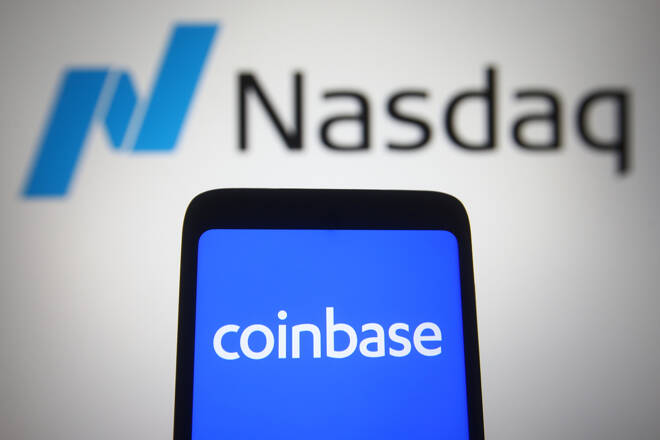Advertisement
Advertisement
Coinbase Q4 Earnings Results and SEC v Coinbase: Insights and Implications
By:
Coinbase delivered impressive Q4 earnings that were in stark contrast to Q3, highlighting the impact of the recent thawing of the crypto market winter.
Key Insights:
- Coinbase shares rallied 14.31% to $189.29 in after-hours trading as investors reacted to Q4 earnings results.
- The thawing of the crypto winter drove net income to $273 million in Q4.
- The return to profits coincided with increased focus on the SEC v Coinbase case.
Coinbase Q4 Earnings Results
On Thursday, Coinbase (COIN) released its fourth-quarter and full-year earnings after the US closing bell.
In Q4, Coinbase reported a 41% increase in total revenue to $954 million. Adjusted EBITDA (earnings before interest, taxes, depreciation, and amortization) surged 69% to $305 million. Significantly, Coinbase reported net income of $273 million.
Highlights included:
- Higher volatility levels and crypto asset prices driving transaction revenue up 83% to $529.3 million in Q4.
- Consumer transaction revenue increased 79% to $493 million.
- Consumer trading volume surged 164% to $29 billion.
- Subscription and services revenue increased 12% to $375 million quarter-on-quarter.
For the fiscal year 2023, Coinbase reported a total revenue of $3,100 million and an adjusted EBITDA of $964 million. The better-than-expected outing in Q4 delivered a 2023 net income of $95 million.
Coinbase forecast Q1 2024 subscription and services revenue between $410 – $480 million, up from $375 million in Q4 2023.
Coinbase shares increased by 3.30% to $165.67 on Thursday during regular trading hours. During after-hours trading, shares surged 14.31% to $189.37.
Beyond the numbers, Coinbase gave an update on its litigation stages.
SEC v Coinbase: Motion to Dismiss Ruling Awaited
Within the Shareholder Letter for Q4 2023, Coinbase highlighted the SEC v Coinbase case remains ongoing. The SEC and Coinbase await a ruling on the Coinbase Motion to Dismiss (MTD).
Coinbase filed a Motion to Dismiss in August 2023, arguing the SEC lacks the statutory authority to regulate US crypto exchanges. In January 2024, presiding Judge Katherine Failla heard oral arguments from Coinbase and the SEC for and against the MTD.
Legal experts tilted the scales of justice in Coinbase’s favor. Bloomberg Intelligence Senior Litigation Analyst Elliot Z. Stein attended the hearing and gave Coinbase a 70% chance of winning. Stein noted that Coinbase gave a more convincing definition of an investment contract. The Senior Litigation Analyst also thought the case could reach the US Supreme Court if it survives.
The shareholder letter outlined the probable next steps contingent upon the ruling on the Motion to Dismiss. These were as follows:
- Judge Katherine Failla grants the Motion to Dismiss in full: The SEC will likely appeal.
- If the Motion is granted in part but denied in part: The case will likely proceed to discovery on the claims that have not been dismissed.
- Judge Failla denies the Motion to Dismiss in full: The case will proceed to discovery on all claims.
A ruling could come at any time. The ruling could have significant implications for the US crypto market.
US Treasury Secretary Janet Yellen may have inadvertently assisted with the Motion to Dismiss. Giving testimony at a Financial Services Committee hearing, Secretary Yellen called on Congress to pass legislation to provide a regulatory framework for cryptos that are not securities. The call on Congress highlighted the lack of legislation granting regulators to oversee the US crypto market.
About the Author
Bob Masonauthor
With over 28 years of experience in the financial industry, Bob has worked with various global rating agencies and multinational banks. Currently he is covering currencies, commodities, alternative asset classes and global equities, focusing mostly on European and Asian markets.
Advertisement
